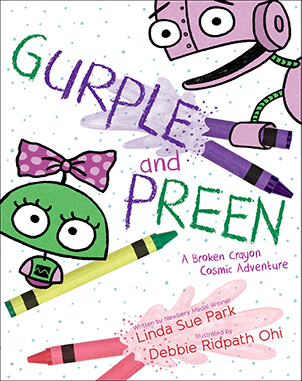If you'd like to see older WWFC strips, please check the Will Write For Chocolate archives or start from the beginning. You can also follow WWFC on Facebook, Pinterest and Google+. Thanks so much for your continuing support! -- Debbie
Writers and RSI (Repetitive Strain Injury) Prevention
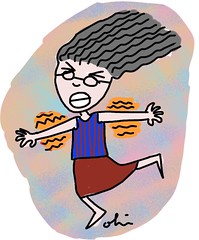 |
The next day, it was still sore. I decided to stay off the keyboard and do some much needed organizing of my office instead, moving books around. I went to the gym later in the day and did my regular workout, including weights. At no point was there a sharp "OW!" type of pain; I still felt just a general soreness, not too serious.
I started typing with my left hand to give my right a break, as well as leaning on my left hand for other tasks as well. Soon my left was worse than my right.
To make a long story short, after only a few days I was in constant pain, and barely able to hold a glass of water. I couldn't even cut my own food. Even turning pages in a book was painful. And the nightmare of every writer: I COULDN'T TYPE. I even tried holding a pencil and poking at the keys that way, but it was too painful.
Meanwhile, I had gone to see a doctor, who sent me to a physiotherapist. My problem wasn't in my wrists (i.e. I didn't have carpal tunnel syndrome); it was in the tendons, which I had managed to tear. I was told I had "golfer's elbow" AND "tennis elbow" in both arms. Ironically, I don't play either game. The physiotherapy clinic treated me with ultrasound, hot/cold pads, and massage. I learned how to exercises that would gradually heal and strengthen my tendons. I was told that if I had taken a real break that weekend after my first symptoms appeared instead of re-organizing my office and going to the gym, I would likely have recovered almost immediately.
Eventually I had to acknowledge the fact that I wasn't going to get better as quickly as I had hoped. I bought and starting using ViaVoice, voice recognition software for the Mac. I was impressed by how accurate it was with transcription, but the resulting text almost always needed some editing and I found editing an agonizing process. Sample sequence of voice commands to delete an extra character in a word: "Move down four lines." "Move right five words." "Move right two characters." "Select right one character." "Delete." I had to speak these commands slowly and clearly, else the program would think that I was dictating text. Once I got so frustrated that I swore into my microphone ... and ViaVoice censored my swearing.
Trying to write this way was torture, but better than not being able to write at all.
 |
Three years later, I'm much improved and haven't used ViaVoice in a long while. But I've smartened up: I take regular breaks away from my keyboard. If I feel any pain, I stop and take a break (yes, even if I have a deadline). I set an alarm on my computer using a small app called IMOnTime to remind me to take a short arm break every 30 minutes. During this break, I walk around, do arm stretches.
Before the tendinitis hit, I never had problems...there was no gradual accumulation of warning signs. I'm telling you all this in hopes that my experience will help prevent some of you from repeating my mistakes.
Some things I've learned:
Take breaks, even if you're under work pressure.
Never ignore soreness and pain.
Don't assume that you're invulnerable. That's the mistake I made.
If you do hurt yourself, be patient while you're healing. Don't try to get back to "normal" too quickly or you'll have another setback (I speak from experience). It took me about THREE YEARS to get back to a relatively normal work schedule.
Some useful resources:
Computer related repetitive strain injury: My favourite RSI page.
Ideal typing posture
Ergonomic guidelines for arranging a computer workstation
Avoiding Repetitive Strain Injury (Forbes article)
Repetitive Strain Injury
How to prevent RSI
 ergonomics,
ergonomics,  health,
health,  rsi in
rsi in  Blog/news
Blog/news Tax tips for freelance writers
I do whatever I can to make it more pleasant: play my favourite music in the background, use nice pens and special paperclips (I'm an office supply addict), reward myself when I've finished. Yes, of course there's the obvious reward of getting the paperwork finished, but I also like to reward myself with something more tangible...like a single chocolate truffle from our local chocolatier, for example. :-) I welcome tips from you super-organized writers out there!
Anyway, this time I decided to make it more interesting by surfing the Web for tax tips specifically for freelance writers and writing about it in this column. Sadly for me, the focus is mainly U.S..
Here are some of the resources I thought looked useful (all refer to U.S. tax laws unless noted):
Handling Writing Income And Expenses by Moira Allen. From Writing-World.com. A great article on how to keep organized throughout the year to make it easier around tax-time as well as tips on tax prep.
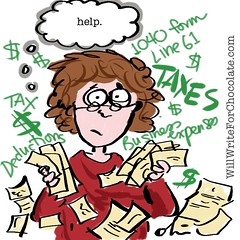 |
Tax Answers For Freelance Writers by Jessica Ramirez. This three-part article answers questions like: "What are the most common mistakes new freelance writers make when they file their taxes for the first time?", "What kind of records should a writer get together for filing taxes?", "How does a writer decide what to write off as an expense? In other words, what's acceptable?", "What if freelance writing is a part-time position and a freelancer has a full-time job? How will that influence a tax return?" and "Should a freelancer pay someone else to do their taxes or should they use tax software? What's the difference?"
Freelance Factor: Tax Tips For Freelance Writers: About half a dozen articles by Julian Block. "Profit Vs. Pleasure: IRS Rules Strict on Losses", "Estimated Taxes: Another Deadline Coming Up", "Filing Time Reminders for Freelancers", "Better Tax Breaks for Freelancers", "Award Winning Writers, Artists and Photographers are Losers Under the Tax Laws" and "How Long to Keep Records."
Taxes for the Writer Abroad by Nancy Arrowsmith. From Writing-World.com. Tips on how to avoid double taxation and how to avoid paying taxes in Europe.
Tax Tips For Writers by Daniel Steven. Part of AbsoluteWrite.com. Somewhat outdated (mentions changes specific to 2002) but still has useful tips that still apply to all freelance writers.
Tax Tips For Writers by Bob Brooke. This focuses more on record-keeping tips throughout the year.
Taxes and Freelancing by William Perez. The article is for freelancers in general, but it does mention special circumstances that apply to freelance writers.
Tips for Freelance Writers: Filing Taxes by Katharine Swan. Be sure to check out Katharine's blog for other useful tips for writers.
Writer's Pocket Tax Guide by Darlene Cypser is available in paper or electronic format.
Tips for Canadian freelance writers
I was still unable to find much online specifically for Canadian writers except for the following:
Finances For Freelancers: Notes taken at an evening seminar of the Toronto Chapter of the Periodical Writers Association of Canada (PWAC).
If you know of other useful resources, please do let me know!
Reader feedback for "Finding Time To Write"
Do check out Angela Giles Klocke's blog for writers, submissions/rejections tracker and other useful resources on her site including her free e-book: WRITE TODAY! Balancing Writing WITH Parenting.
Deborah Ng suggests getting a laptop: "I write more now that I stopped using my old, behemoth computer. Many times my son wants company, not necessarily a playmate. The laptop allows me to be in the same room or area. On nice days I can bring the laptop on the deck and work while he plays outside, I take it with me to the inlaws and work while he's being spoiled. Now that I've perfected the art of finding time to write, I need to learn how to take time for me!"
Katharine Swan agrees: "I've been writing on laptops since the best used machine you could get was a 286…the old processors, not pentiums! My newest baby is an Averatec that is so small it's - no joke - smaller than a piece of paper, and weighs only about three pounds. AND it gets this small without sacrificing any of the normal stuff that laptops have! (Except the gigantor screen, that is.) A little, portable laptop like this one is a writer's best friend!"
Tina Chaulk responded to a reader's question about the Alphasmart as an alternative to a laptop: "I absolutely recommend the Alphasmart. I got a new Neo recently and since it has almost no working parts and no Internet access (means no crashes and no LJ friends or other Internet diversions), and lasts for asbout 700 hours on 3 AA batteries, I have been writing everywhere with the little thing. My son plays nearby and I bang away on the keyboard."
Mew liked one of the small comics I included with my last column: "I just think I should tell you that I printed out a little copy of the 'LJ friends list' cartoon and have laminated it to my laptop next to the touchpad. You cruel woman. :-)"
Mindy appreciated reading others' comments: "Reading these contributions from the other parents I no longer feel isolated. I have twin boys just turned 5 years old. It is nearly impossible to write with them around, but, this has inspired me to make a concerted effort to make the time. I am very new at the online process of writing and reading, but when writing a story for children it puts me in a place called Heaven. Now the reality, getting published. Oh the process."
Finding time to write (even if you have kids)
Relatively few writers have the luxury of devoting their entire workday to their writing. Some have day jobs while others may have school or young children at home. Finding the time to write can be a challenge.
Here are some tips for those trying to carve out some time for their writing. Keep in mind that what works for someone else may not work for you; you'll need to do some experimenting. In the end, it's not so much finding time to write as making time to write. If you have other tips to contribute, please do post them below!
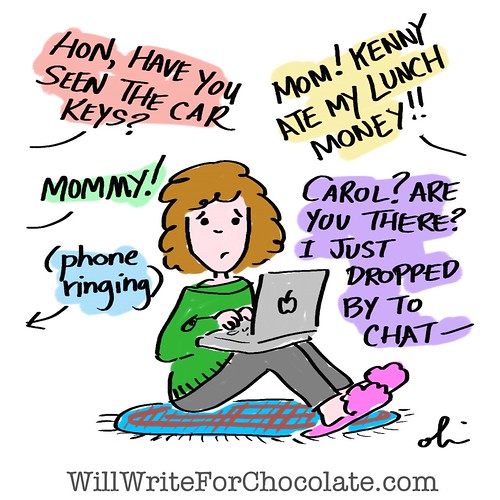
- Get up an hour earlier to stay up an hour later. Deborah Ng wakes up at 4 am, for example, but this method doesn't work for all writers. As John August points out in this blog post: "Some how-to-be-a-writer books will recommend you get up an hour earlier, or stay up an hour later in order to write. If that works for you, God bless, because I need every bit of sleep I can get."
- If you write best in the morning, do some of your morning chores the evening before instead (e.g. making lunches for your children, setting out their clothes and school supplies, and so on).
- Learn how to get into "writing mode" quickly. If your writing time is limited, you don't have the luxury of easing gradually into writing time.
- One way to do this is to make sure you have everything you need in one place, so you don't waste precious minutes looking for a pen or your notes.
- Learn how to write in small chunks of time rather than only being able to write when you have a solid, uninterrupted period of time.

- Don't answer the phone. If it's important, they'll leave a message.
- Tell your family what you're doing so you can enlist their cooperation. Put a "DO NOT DISTURB" sign on your office or (if you don't have an office) have some other way of letting other household members that you aren't to be disturbed. Teach others to respect your time.
- Delegate some household chores. Put off housework until it really needs to be done.
- Cut down on some other non-essential daily activity, like watching tv or surfing the Web.
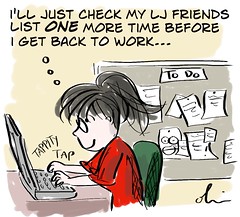 |
- Take a hard look at other regular activities to see what can be given up so that you can get more writing time. Set your priorities.
- Set small, reachable goals. Instead of aiming for 1000 words a day, for example, try for 100 words. Or 50. Alternatively, set goals of writing for a certain period of time, such as 30 minutes a day. Or 15. Or 10. Writing every day will also help keep your project fresh in your mind, decreasing the time you need to mentally review before starting that day's session.
- Carry around a small notebook and a pen. If you find yourself in a traffic jam or waiting for something or someone, do some writing. I tend to focus on brainstorming about article ideas and potential markets, poetry and working out plot and characters for my novel.
From Shauna Smith Duty: "Being a parent who follows her passion (writing), as you know, is tough! I am constantly interrupted with pre-algbra and book report questions from my little darlings, and my dear husband works from home, too. My mother-in-law recently moved in with us, and she just walks around trying to stay out of everyone's way. It's a busy little home we live in, and writing/reading/editing is part of who I am. Everyone who loves me knows that at hockey games, I'm the one with a lap full of papers and a fistful of highlighters and red pens. In the morning, I'm the one holding an interview on the phone headset so I can type a book review with my hands. My kids know how to make coffee and take messages very well, thank goodness. I suppose they have two jobs, too - mom's personal assistants and being a fourth and fifth grader. "I applaud ALL parents who work at home with their children under foot (or under desk). Not only is it a sacrifice and a struggle, it's a great example for kids to learn how to work hard and juggle other responsiblities. Bravo, work-at-home parents!" |
After reading the tips above, you may still be sighing and convinced you're too busy to write. In that case, John Hewitt has some good advice at the end of his article Finding Time To Write:
"Writing is not for everyone. If you keep trying, and failing, to make the time to write, then it may not be for you. You may want to write, but if the desire is not enough to keep you from doing more entertaining or pressing activities, then perhaps writing isn’t for you. It may become more meaningful to you at another point in your life, but don’t feel guilty about letting it go. When it is important enough to you to make some sacrifices, you’ll be able to make them." |
Some useful online articles on this topic:
So, When Do You Find The Time To Write? by Ann Douglas. A frank and honest response to this frequently asked question, by a work-at-home mother. "Does my writing schedule work out perfectly day-after-day? Do I always sit down at my desk at exactly 9:30 am, open the lid of my computer, and type a brilliantly-worded sentence, smile to myself, and launch into my writing day? Of course not! That only happens in made-for-TV documentaries about writers -- and generally writers who don't have kids."
Finding Time To Write by Connie Shelton. Shelton manages to average writing one book a year while running a full-time publishing venture. Shelton offers useful tips to novelists.
Time and the Writer by Moira Allen. "Time is never 'found.' Time can only be 'made.' If you decide to wait until your kids are in school, or in college, or you have enough money to quit your day job, or retirement, you could wait forever. The only way to make those writing dreams come true is to start looking at the time you have now, today -- and find ways to make that time work for you instead of against you."
Finding Time To Write by Danielle Hollister at Bella Online. Hollister offers tips for mothers: "For some mothers, like me, our best time to write may be when our children are sleeping or at school depending upon their age."
Finding Time To Write When You Have No Time To Write by Karen Fenech at AbsoluteWrite.com. Fenech manages to grab time to write whenever she can: "Part of my problem with getting my writing done was that I wouldn’t write unless I could reserve a big block of time to do it. I rarely could do that, so I didn’t write at all."
Finding Time To Write by Sue Reichard. Reichard advises trying another type of writing if you're still having trouble finding time: "You say you've tried all of the above and you still have no time to write. Consider then, a different type of writing. Instead of a children's novel, write a short story, poetry or a filler for a children's magazine."
Finding Time To Write by John August. "I would take my PowerBook 180 into work, then type up those pages on my lunch break. Repeat this process for four weeks, and I’d written a script. As a bonus, I’d avoided banal office lunch conversation."
Finding Time To Write by Tamra Norton. This mother of seven (!!) found time to write. "I have learned through trial and error that my peak writing time - the time when I’m most creative and productive - is after my little ones have gone to bed."
 finding time,
finding time,  time management in
time management in  Blog/news
Blog/news Deborah Ng: work-at-home mother AND successful freelance writer
I felt inspired to interview Deborah Ng for this week's column because like Eliza, Deborah quit her day job to become a freelance writer.
Despite having a young son at home also clamoring for attention, Deborah has enough freelance work to keep her busy fulltime. "Bills are being paid and money is going into the bank or being put towards 'extras,'" says Deborah. "I'm taking this month's earnings and buying myself a new stove! A big one with lots of burners and two ovens!"
Deborah spent 12 years as an Administrative Assistant for a publishing house in NYC, after which she worked for four years in the accounting department of an upscale bath and tile chain. Her publishing house experience helped Deborah learn what editors looked for, and she also did some writing and proofing in her job.
 |
What prompted her to make the leap to freelance writing? "I always loved to write and I hated office work. When my son was six weeks old we moved to another state. I didn't want to return to filing and typing, so I gave myself a year to find enough work to pay the utilities."
Deborah's strategy: troll markets every day, be professional
Success didn't come right away, and Deborah found herself facing more rejections than acceptances in the first year. The following year, however, her career "really took off." Deborah read every job board she could find, made sure she submitted a query or answered a call for writers every day. It took a while, but she was able to build up a good reputation and a strong client base.
"I think my career took off because I worked so hard. I had options, I could either be a stay at home (or work at home) mom, or I could go back to working in an office. How could I do that when I hated office work so much? I just kept conjuring up images of all of the mean, snippy bosses I had before. Fear is a great motivator! Half my time was spent writing, the other half was spent looking for work. I took the job hunt seriously and didn't stop looking just because one client called. I still take at least an hour each day to troll the markets. I also do what I promise. I do the work and I do it well. I don't flake on editors just because a task is unattractive and I proof my work before turning it in. It's important to be professional."
Deborah says she typically wakes up at 4 a.m. (yes, I said 4 a.m.!!) and works until 7 or 7:30 a.m., when her husband and son wake up. "If I was working late the night before or if my son had a rough night, I might sleep later. On preschool days, I work another couple of hours while my son is in school, otherwise I work sporadically throughout the day if my son is keeping himself occupied. I'll also work in the evening anywhere from 1 to 5 hours depending on my workload and most weekends are also taken up with work."
Challenges of being a work-at-home mother
Her biggest challenge? "Convincing others that I needed time to work. People really don't believe that you have a job when you work at home. At first my husband didn't 'get' that I needed time to become successful and it could take a year or more. Now that I'm bringing in a nice income, he understands and helps out more with our son." For phonecalls, Deborah says Caller ID helps, and says she doesn't usually pick up the phone unless she knows it's work-related.
Another challenge Deborah faces at home is balancing her work with the needs of her three-year-old son, but she says, "I primarily left work to stay home with my son. That means that if he needs me I have to be there. I do try and encourage him to keep busy with art projects and fun activities, but for the most part I'm there for him when he needs me, no matter how busy I might be. Sometimes that means I won't get any work done until my husband gets home. In a couple of years he'll be in school every day. I want to enjoy every minute with him I can until then."
 |
Deborah does her work on the kitchen table. "I have a laptop on the kitchen table and a file cabinet in a spare bedroom. My husband is renovating but it's been a slow process. Hopefully when the house is done, I'll have an office."
Here are just a few of Deborah's online projects:
Writers' Row: "Writers Row is a community made up of other writers in various stages of their careers. Most, like me, write mostly web content. We all have blogs and websites offering advice and information to other aspiring writers. There's also a forum and my job leads blog."
Love To Know: Deborah is a Group Editor at this site, which she describes as a "wonderful up-and-coming Wiki community."
SURVEY FOR NEXT WEEK'S COLUMN:
How do YOU find time to write? Please post your answer below.
Some reader feedback for previous columns:
From Mari, who says she likes the writing prompt calendar at the Toasted Cheese community.:
"I have this quote pasted up on the sidebar of my blog: "When writing a novel, that's pretty much entirely what life turns into: 'House burned down. Car stolen. Cat exploded. Did 1500 easy words, so all in all it was a pretty good day.' Neil Gaiman
As for where I get my inspiration? Honestly, most of the time it's 'out of thin air'. For example, yesterday I was sitting working on one thing, when a scene for something else sideswiped me. And sometimes, the characters I'm writing get into my head and just won't shut up. The only thing to do is to get the pen out."
From Dan McGee:
"Just found your site through Writer's Weekly and am bookmarking it. Inspiration is where you find it. Like being on a bus and hearing a woman, who was not all there mentally, but was giving college everything she had.
Less than an hour later being on another bus and finding a beautiful woman, who proved to everyone on board that she was an idiot. Cellphones are great for that as their users always seems to yell.
Keep up the good work, liked what you wrote."
 deborah ng,
deborah ng,  interview,
interview,  work-at-home mother in
work-at-home mother in  Comics
Comics Finding writing inspiration
First of all, thanks to Angela Hoy for giving Will Write For Chocolate a plug in her weekly e-mail newsletter for freelance writers, WritersWeekly. :-)
When I was in my early teens, I used to write fan letters to my favorite authors. In retrospect, I'm surprised at how many wrote back; some of them must have received hundreds of letters like mine on a regular basis. Here's a letter that Stephen King sent to me, for example. I asked Michael Crichton where he got his ideas...proudly thinking at the time, I'm sure, that I was asking an incredibly interesting question he had never received before. To Crichton's credit, he graciously responded with a handwritten note in which he also thanked me for my letter. His answer to my question about where he got his ideas: They just happen.
Nowadays, I carry a small notebook around with me all the time as well as a pen or pencil. I didn't always do this. Years ago, when I was first starting to write professionally, I recall being frustrated and somewhat panicked. It seemed like all the Good Ideas had been taken; what was there left to be written about? Whenever I did try to write something, the words seemed to fall flat and lifeless.
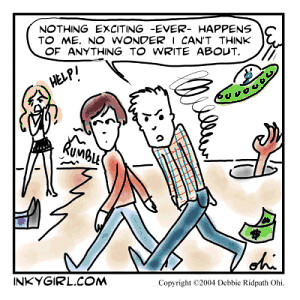 |
In desperation, I decided I needed an afternoon off, took a book and went to a nearby family diner. It was crowded, but I managed to find a seat near the window. Ordered something to eat, opened my book...but then got distracted by a conversation between two women sitting at a table next to me. They were clearly unhappy with a co-worker who had gotten promoted.
At first, I admit to feeling a tad guilty about eavesdropping. But then I thought, hey, they're having this conversation in a PUBLIC RESTAURANT.
After recovering from this momentary pang of conscience, I couldn't help but notice the interaction between a man and woman a few tables away, who were obviously having some kind of disagreement but not wanting to talk about it too openly. They wielded their cutlery like weapons and avoided each other's gazes as they went through the motions of a civilized meal.
And then there was the somewhat scruffy older man in the corner, obviously a regular. He was pretending to read the newspaper, but he kept surreptitously looking around the room...just like me.
Hm, probably a writer.
So many stories, and so many interesting characters! I was immediately inspired to incorporate some of these into my own writing projects.
And I realized that I had been retreating into hermit mode over recent weeks, mistakenly assuming that the self-imposed isolation would force me into greater creativity. What I needed instead: to get out in the world, to start listening and observing with a writer's ears and eyes, to start noticing again.
I've found this applies to non-fiction writers as much as fiction. Possible article ideas lie waiting in every dreaded cocktail party, every conversation, every stroll through the neighborhood. Not necessarily GOOD ideas, mind you; the next step, of course, is picking and choosing what interests you most, deciding on which ideas to pursue, which have the most potential.
So...where do YOU get your ideas? What inspires you to write?
Some related online resources
(feel free to post others you'd recommend to writers!)
Sal Towse has a section devoted to "creative nudges" in her massive writers' resource site.
Writing prompts from Writer's Digest, Creative Writing Prompts, WritingFix.com, Creativity Portal.
You can find some inspirational writers' quotes in En.Proverbia.net, Logicalcreativity.com and Mockingbird.Creighton.edu: I've always loved quotes by and for writers. If you have any favorites, please do post them below!
 inspiration in
inspiration in  Blog/news
Blog/news 




